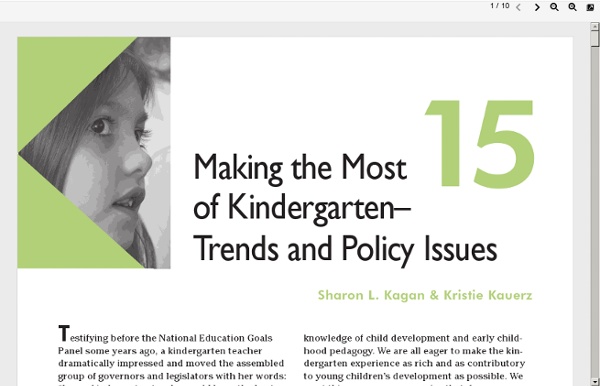



http://www.naeyc.org/files/naeyc/file/Play/KTodayPolicy.pdf
Study: Full-Day Kindergarten Boosts Academic Performance By: Debra Viadero This article says that according to a new study, former full-day kindergartners were more than twice as likely as children without any kindergarten experiences – and 26 percent more likely than graduates of half-day programs – to have made it to 3rd and 4th grade without having repeated a grade. This study was presented at the annual meeting of the American Educational Research Association. A study of 17,600 Philadelphia schoolchildren suggests that full-day kindergarten programs may have both academic and financial payoffs. The study found that, by the time they reached the 3rd and 4th grades, former full-day kindergartners were more than twice as likely as children without any kindergarten experiences-and 26 percent more likely than graduates of half-day programs-to have made it there without having repeated a grade. The study's cost-benefit information comes at a critical time for the debt-ridden Philadelphia school system.
Tracking Pre-K Assessment Policies Across the States As enrollment in pre-K programs grows, state lawmakers are developing strategies to monitor these programs and determine their impact on student learning and readiness for school. According to a new report from the Educational Testing Service, 50 state-funded pre-K programs in 40 states have established at least some policies for collecting such data—but every state must grapple with the difficulty of assessing the youngest children, who are not developmentally ready for traditional, pencil and paper tests. The recent report, “State Pre-K Assessment Policies: Issues and Status,” explores the challenges related to assessing young children’s learning, details various approaches to doing so and summarizes the status of pre-K assessment policies across the states. Authors Debra J.
Earlychildhood NEWS - Article Reading Center It was three o'clock and preschool was over for the day. Four-year-old , her arms full of papers, called out to her mom. 's mother smiled and asked, "What's all this? Your school work?" nodded and handed the papers to her mother. had spent a large part of the afternoon in her seat, pencil in hand, filling out worksheets. On one she had drawn lines from the letter "A" to the picture of an apple; from the letter "P" to the pear; and from the letter "O" to the orange.
This article takes a look into policies concerning the needs of young children, how Kindergarten is evolving from the past, the access of services, culturally sensitie environments, and the Kindergraten debate. With children now coming from all over the world, new diagnosis's being made, and new studies happening, today's schools are drastically changing. The trends and policies of yesterday need to go and new needs to be brought in. by colbeebush Apr 10
Gullo, D. F. (n.d.). Retrieved from by colbeebush Apr 9